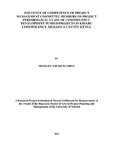| dc.description.abstract | The study envisaged establishing the influence of competence of project management committee members on project performance: a case of Constituency Development Funded projects in Kiharu Constituency, Murang’a County Kenya. The study sought to establish how the individual competence of the project management committee members, the capacity to employ information management technology, their financial management skills and project identification and management influence the performance of projects. The study employed a descriptive survey research design and the population of interest was thirty six members of the project management committees from the six wards and the constituency fund manager. The census sampling method was used for sampling purposes. This is because the PMC’s were few and thus considered as a fairly manageable number to be reached in totality. The study collected data by use of questionnaires which were administered to the PMC’s while the fund manager was subjected to a scheduled interview. The data was analyzed by use of qualitative and quantitative techniques. The qualitative techniques entailed content analysis and aligning the information that was collected from the field with other studies carried out in the realms of accountability in the constituency development fund management and related fiscal decentralization activities. The quantitative data analysis entailed both descriptive and inferential statistics. The descriptive statistics entailed mean, mode and measures of central tendency while the inferential statistics entailed chi-square tests and spearman rank order correlations. The study found out that: All the respondents were aware that there was a basic minimum requirement for the education levels of the project management committee members as pertains to academic proficiency. Most of the respondents (71%) considered the predominant information storage system in use as electronic and 59% of the respondents deemed the information storage procedures in place as adequate enough to meet the demands of the CDF projects. Most of the respondents (59.4%) deemed the members of the project management committees as well versed with the financial management procedures in place. The mode of project identification for the programs undertaken by CDF was predominantly found to be popular public participation in project determination (53%). The study recommended that: The CDF should place emphasis on the training of the project management committee members as a premise of ensuring that they have the requisite skills to carry out their activities effectively. Capacity building for information storage activities should be carried out on the part of the fund. This will ensure that enhanced scrutiny of the projects undertaken is actualized. The CDF should streamline the financial processes in place with a view of enhancing their capacity to mitigate against the risks of losses to the institution. This may enhance the ability of the populace to derive the intended benefits from the activities carried out by the fund. The governance practices of CDF should equally be fully implemented with regards to the provisions stipulated in the act. This may potentiate the ability to ensure ownership of programs and the capacity to enforce provisions for civic duty by the public as pertains to project identification and related requisites of the CDF programs. | en_US |

